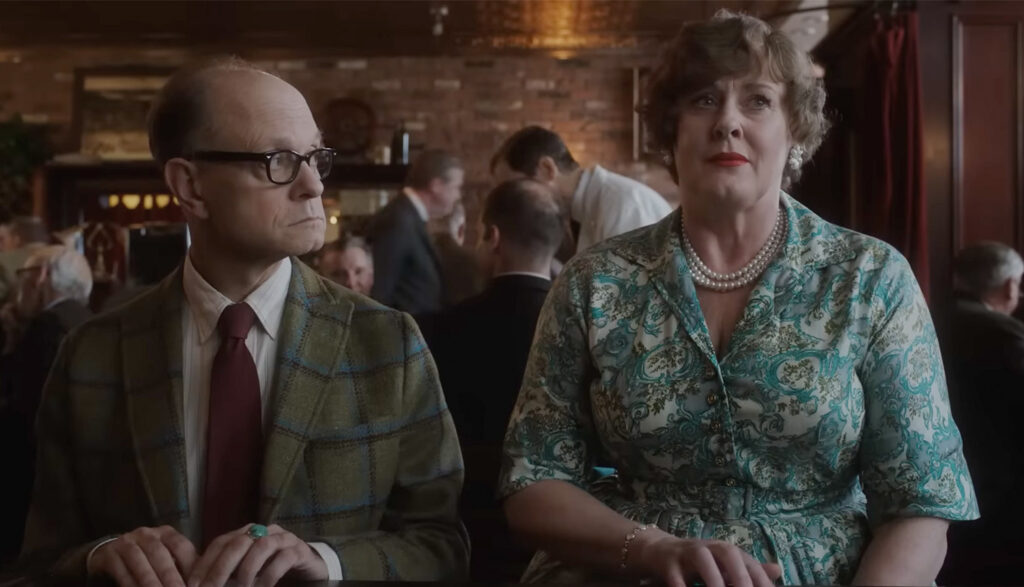
Finding Her Edge
All in all, Netflix’s ‘Finding Her Edge’ could use a bit more sharpening to hone its own edge.

Before viewers could sift through the myriad of Food Network’s cooking show options, there was Julia Child.
Julia Child moved to Paris with her husband, Paul, and studied at the esteemed Le Cordon Bleu cooking school, learning the intricacies of French cuisine. As she honed her culinary skills, Julia met Simone Beck and Louisette Bertholle, who joined her in a quest to make French cooking methods accessible to Americans. In 1961, the three women published their cookbook, Mastering the Art of French Cooking.
Max’s TV drama, Julia, begins when her cookbook becomes wildly popular with the American public.
Prompted by Paul’s career responsibilities, the Childs move to Cambridge, Massachusetts. There, WGBH-TV (a public television station) invites Julia to promote her book on one of their shows. Unsure of what to say on air, Julia cooks an omelet instead.
The men at WGBH-TV are unimpressed. But Julia’s performance charms associate producer Alice Naman and women across America. Housewives stop Julia in the street to thank her for her cooking tips, and WGBH-TV receives a record-breaking 27 letters from happy viewers.
Inspired by the positive response to her appearance, Julia cooks up an idea: a self-hosted television cooking show.
Most of the producers at WGBH-TV aren’t thrilled with the idea, but Alice believes it could yield success. Through Julia’s and Alice’s persistence, the producers give Julia’s show—The French Chef—a chance.
But in Season Two, we see that Julia’s battles aren’t over yet. Planning to write a sequel to her cookbook, Julia returns to France to reconnect with her colleague, Simca (who helped write the last cookbook)—and bicker about what it should include. Meanwhile, back in the United States, Alice experiences pressure to continue producing popular content for the WGBH-TV.
You’d think a show about a 50-year-old French chef with a sing-song voice would be completely devoid of impropriety. But when it comes to Julia, you’d be wrong. Characters regularly spew profanities, including misuses of God’s name and the f-word. Characters make sexual innuendos, and we occasionally see people in sexual scenarios, though nothing critical is seen. In one episode, Julia meets a drag queen, whose lifestyle—despite the show’s early 1960s setting—is generally accepted.
As characters dine, they often indulge in alcohol, and characters become drunk in one cene. Most episodes also include characters who smoke.
Nonetheless, Julia does offer some positive commentary.
In the first season, Julia encounters feminist author Betty Friedan, who dislikes Julia’s cooking show. Friedan claims that through her cooking tutorials, Julia has “nicely raised the bar on what it means to be a good wife.” The author asserts that Julia’s show traps women in thankless, domestic jobs. Ultimately, Julia disagrees with Friedan’s assertions. Julia skillfully juggles her roles as a wife and homemaker with her television career, and female viewers state that Julia’s show has inspired them in their roles at home.
Julia offers a heartfelt glance into Julia Child’s personal and professional life. As viewers may find themselves salivating over Julia’s delectable dishes, the chef celebrates victories and overcomes defeats. Unfortunately, the language concerns, alcohol, and sexual content might make Julia unpalatable to some consumers.
After Julia makes her television debut to promote her French cookbook, the chef conceptualizes an idea for a self-hosted cooking show.
Characters use profanity include four uses of the f-word, two uses of the s-word, four uses of “d–n,” and six misuses of God’s name (paired with “d–n” four times).
A character makes a slight sexual innuendo, and we see a married couple begin to engage in sexual relations (though nothing critical is seen).
Guests enjoy alcohol at a dinner party and several characters are seen smoking.
Julia and Paul engage in minor disputes, and Julia conceals information about her cooking show from Paul. Later she secretly makes a purchase that Paul would not approve of.
In France, Julia and Simca quarrel about the content of their cookbook. Back in the United States, executives at WGBH-TV piles responsibility on Alice, though she prepares to shoulder the challenge. Meanwhile, Julia’s cookbook publisher, Judith, struggles with her heavy workload.
Several characters drink alcohol. In one scene, a man accidentally consumes LSD and experiences side effects.
There are several sexual references and innuendos. One scene features the start of a sexual encounter between a married couple (though nothing critical is seen). A married man casually reveals that he has a mistress, and references to this unfaithfulness are jocular.
A character offhandedly mentions that he does not believe in God. We hear one use of the s-word.


All in all, Netflix’s ‘Finding Her Edge’ could use a bit more sharpening to hone its own edge.

Two families try to recover from a critical loss in the Wonder Project’s faith-tinged ‘It’s Not Like That.’ But the show has more content than you’d expect.

In Star Trek: Starfleet Academy, Paramount+ introduces a new generation of Federation cadets who train to make a positive difference in the universe.

‘The Pendragon Cycle: Rise of the Merlin’ is DailyWire+’s most ambitious show yet—and it comes with a Christian bent. But the show itself feels pretty uneven.